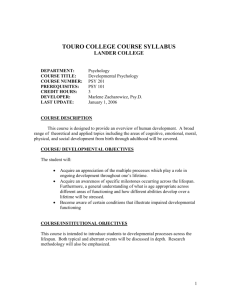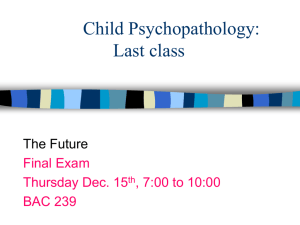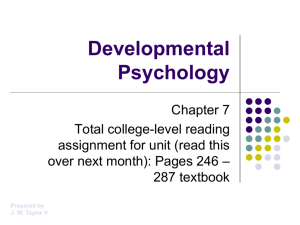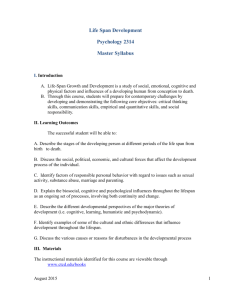Southern Maine Community College South Portland, Maine 04106
advertisement
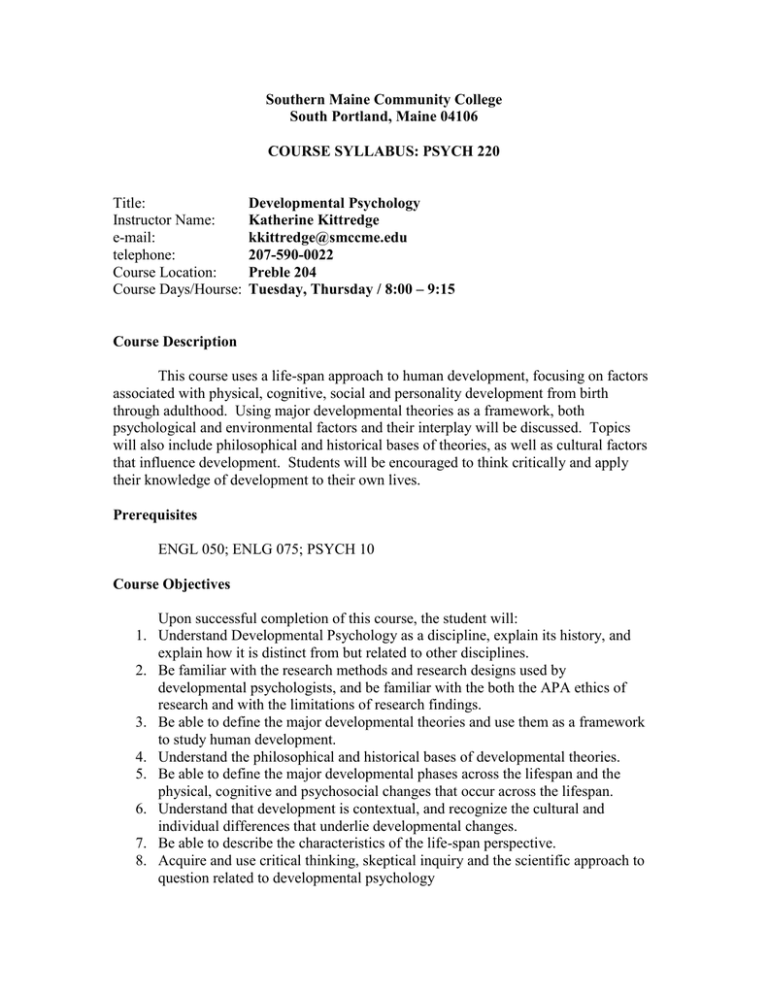
Southern Maine Community College South Portland, Maine 04106 COURSE SYLLABUS: PSYCH 220 Title: Instructor Name: e-mail: telephone: Course Location: Course Days/Hourse: Developmental Psychology Katherine Kittredge kkittredge@smccme.edu 207-590-0022 Preble 204 Tuesday, Thursday / 8:00 – 9:15 Course Description This course uses a life-span approach to human development, focusing on factors associated with physical, cognitive, social and personality development from birth through adulthood. Using major developmental theories as a framework, both psychological and environmental factors and their interplay will be discussed. Topics will also include philosophical and historical bases of theories, as well as cultural factors that influence development. Students will be encouraged to think critically and apply their knowledge of development to their own lives. Prerequisites ENGL 050; ENLG 075; PSYCH 10 Course Objectives Upon successful completion of this course, the student will: 1. Understand Developmental Psychology as a discipline, explain its history, and explain how it is distinct from but related to other disciplines. 2. Be familiar with the research methods and research designs used by developmental psychologists, and be familiar with the both the APA ethics of research and with the limitations of research findings. 3. Be able to define the major developmental theories and use them as a framework to study human development. 4. Understand the philosophical and historical bases of developmental theories. 5. Be able to define the major developmental phases across the lifespan and the physical, cognitive and psychosocial changes that occur across the lifespan. 6. Understand that development is contextual, and recognize the cultural and individual differences that underlie developmental changes. 7. Be able to describe the characteristics of the life-span perspective. 8. Acquire and use critical thinking, skeptical inquiry and the scientific approach to question related to developmental psychology Learning Outcomes Critical Thinking: Upon completion of this course students will have 1. demonstrated an understanding of complex ideas by identifying key concepts in the field of psychology. 2. applied theory to practice using problem solving techniques and data analysis. 3. analyzed and evaluated research data to produce well-reasoned argument or position on an issue Global Citizenship: Upon completion of this course students will be able to 1. explain how social interactions are influenced by local, regional, national and/or global cultures 2. recognize cultural and individual differences that underlie the complexities of human behavior Text Berk, L.E., Exploring Lifespan Development, 2nd ed., Allyn & Bacon Course Requirements and Grading Please think of all of the following as opportunities to share your knowledge and interests with me as well as show me what you have learned. 1. There will be weekly quizzes. Taken together, these will account for 25% of your final grade. 2. There will be three short (1-2 page) papers. Taken together, these will account for 30% of your final grade. 3. There will be four exams that together will account for 40% of your final grade. 4. There will be a presentation that will account for 5% of your grade. Missed Classes You are responsible for all material covered in class and in the reading, whether or not you were in class that day. Attendance is required. However, from time to time life interferes. If you are unable to make it to class, you must let me know by e-mail or phone call before the start of class. Students who miss 3 or more consecutive classes without informing me in advance will receive an automatic grade of AF (Administrative Failure). Students who miss 6 or more nonconsecutive classes, regardless of giving prior notification, will receive an automatic grade of AF. Plagiarism Taking and using the writing or ideas of another person without clearly and fully crediting the source is plagiarism and violates the academic code as well as the Student Code of Conduct. If it is suspected that a student has knowingly committed such a violation in any course in which he or she is enrolled, the College Disciplinary Officer will be informed and appropriate action will be taken under the Student Code of Conduct. Sanctions may include suspension from the course and/or a failing grade in the course. Students have the right to appeal these actions to the Disciplinary Committee under the terms outlined in the Student Code of Conduct. In this course, in general, using two or more phrases or sentences from another person’s work without giving credit to the appropriate source will be considered plagiarism. However, I reserve the right to judge each piece of writing on a case by case basis. Add/Drop Policy Students who drop a course during the one-week “add/drop” period in the fall and spring semesters receive a 100% refund of the tuition and associated fees for that course. Please note any course that meets for less than the traditional semester length (i.e. 15 weeks) has a pro-rated add/drop period. There is no refund for non-attendance. Withdrawal Policy A student may withdraw from a course only during the semester within which he or she is registered for that course. The withdrawal period is the 2nd through 12th weeks of the fall and spring semesters and the 2nd through 9th week of 12 week summer courses. This period is pro-rated for shorter length courses. To withdraw from a course, students must complete and submit the appropriate course withdrawal form, available at the Enrollment Service Center (no phone calls, please). The designation ‘W’ will appear on the transcript after the student has officially withdrawn. Failing to attend or ceasing to attend classes does not constitute withdrawal from the course. There is no refund associated with a withdrawal after the add/drop period. ADA Syllabus Statement Southern Maine Community College is an equal opportunity/affirmative action institution and employer. For more information, please call 207-741-5798. If you have a disabling condition and wish to request accommodations in order to have reasonable access to the programs and services offered by SMCC, you must register with the disability services coordinator, Mark Krogman, who can be reached at 207-7415629. There will be some documentation for your teachers that must be supplied before accommodations can be given. Further information about services for students with disabilities and the accommodation process is available upon request at the above number. Topical Outline Dates Topic Homework Week of 1/12-1/16 Introduction, History, Theoretical overview, Research methods Chapter 1 Week of 1/19 – 1/23 Biological and environmental foundations Chapter 2 Week of 1/26 – 1/30 Prenatal development, birth and neonatal development Infant and toddler physical development Infant and toddler physical development, Infant and toddler cognitive development Infant and toddler social and emotional development First exam Early childhood physical and cognitive development Chapters 3 & 4 Early childhood social and emotional development Middle childhood physical and cognitive development Middle childhood physical and cognitive development, Middle childhood social and emotional development Chapters 8 & 9 1st paper due Chapters 9 & 10 Week of 2/2 – 2/6 Week of 2/9 – 2/13 Week of 2/16- 2/20 Week of 2/23 – 2/27 Week of 3/2 – 3/6 Chapters 4 & 5 Chapters 5 & 6 Chapter 7 Week of 3/9 – 3/13 SPRING BREAK – NO CLASSES Week of 3/16 – 3/20 Week of 3/23 – 3/27 Week of 3/30 – 4/3 Week of 4/6 – 4/10 Week of 4/13 – 4/17 Week of 4/20– 4/24 Week of 4/27 – 5/1 Week of 5/4 – 5/8 Second Exam Adolescent physical and cognitive development Adolescent social and emotional development, Early adulthood physical and cognitive development Early adulthood physical and cognitive development, Early adulthood social and emotional development Third Exam Middle adulthood physical and cognitive development Middle adulthood physical and cognitive development, Middle adulthood social and emotional development Late adulthood physical and cognitive development, Late adulthood social and emotional development Late adulthood social and emotional development Death and dying Final Exam Presentations Chapter 11 Chapters 12 & 13 2nd paper due Chapters 13 & 14 Chapter 15 Chapters 15 & 16 Chapters 17 & 18 3rd paper due Chapters 18 & 19
